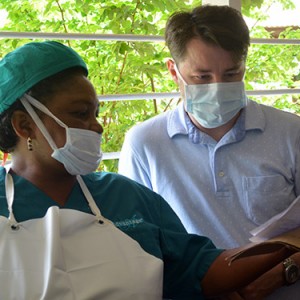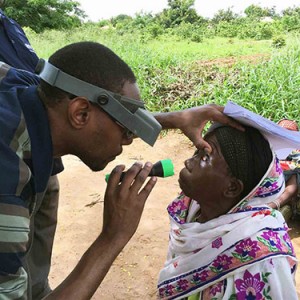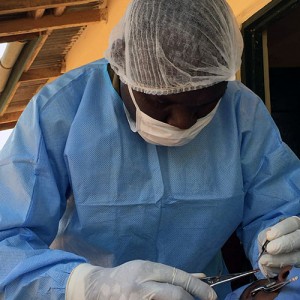IMA World Health/Matt Hackworth
E
veryone called him “Bobo.” There was no last name, and it seemed more of a term of affection for this 78-year-old man who the surgical staff seemed to know from the community. The care Bobo was about to receive extended well beyond terms of endearment. Bobo was about to get his life back.

Dr. Mrumapili shows IMA Board Member Bjorn Sorenson information on a patient about to undergo surgery. (IMA World Health/Josephat Mugunda)
Bobo had endured greater indignities than being stretched nude on an operating table in front of eight strangers, observers to his surgery. The green surgical drape, now removed, revealed a hydrocele – a fluid-filled sack the size of a large mango that painfully enlarged his scrotum.
“Don’t worry, Bobo,” the surgeon said through her mask, her wide, brown eyes locked on his with warmth and poise. “I’m going to take good care of you.”
IMA World Health works with Tanzania’s Ministry of Health and Social Welfare to train medical staff in how to treat patients like Bobo, in addition to paying for the surgery itself. An incision exposed the hydrocele, and a nick of the scalpel gave Bobo a new lease on life. Not necessarily in the literal sense, as this deformity – a result of the neglected tropical disease lymphatic filariasis – is not fatal. But it cripples the soul as much as the body, its shaming bulge and immobility hidden for so long behind an ineffective, improvised truss. Once active males like him are often unable to work and forced to hide in shame.
Bobo’s gregarious personality comes through even under the fog of a mild sedative to relax him. An overnight stay in the medical clinic and a course of antibiotics will have Bobo back to normal soon. Six more patients ready for the same procedure watch as he’s wheeled along the open-air corridor and into the midday sun.
Bobo does not know about IMA World Health and likely never will, but the physicians who treat patients like him every day do. And since our work began in Tanzania in 1994, officials in the government-run health care system here in East Africa’s largest country have come to consider IMA a trusted partner in building their abilities. By working alongside government-sponsored clinics, tapping into the networks of faith-based communities, and with donors who make the work possible, IMA reaches the most remote and forgotten with treatment that changes lives.
A pair of white trucks with high suspensions helped us navigate a bone-jarring red clay road heading inland from Tanzania’s coast to reach Nanhyanga. Around 20 women in hijab look skeptically at me, the tall white man who climbs out of the truck in front of them.

Tandahimba District eye coordinator Pirmin Eriyo examines a patient in Nanhyanga, Tanzania for trachoma – a neglected tropical disease. (IMA World Health/Matt Hackworth)
“As-Salaam-Alaikum” I say, bringing returned smiles from a group I perceive to be a bit nervous.
“Wa-Alaikum-Salaam” they offer in unison.
The women queue under the shade of a tree and wait to be seen by a doctor, clutching a clipboard. With a flashlight and goggles to help enlarge his view, he examines each woman’s eyes for trachoma. Spread via close personal contact and disproportionately affecting women and children, trachoma causes the eyelids to turn inward, making the eyelashes scrape and permanently scar the cornea. The condition is incredibly crippling in eastern Africa, where women collect water, farm, care for children and bear nearly all the responsibility for family life.

Dr. Pirmin Eriyo surgically corrects the disfigured eyelid on a patient in Tandahimba District, Tanzania. Trachoma, a tropical disease spread by insects, caused the woman’s eyelid to swell shut and invert, scratching the cornea. IMA has sponsored more than 13,000 of these surgeries in the last five years. (IMA World Health/Matt Hackworth)
An exchange between the doctor and a nurse, one woman is lead gently by the hand through the medical clinic to its back porch, where an operating table and sterile tools are ready to be used. The light is better here, even if exposed, and there is more room for the physician to treat his patient. Mama – as most women of a certain age are called in this part of the world – calmly lays down while the doctor dons a gown, mask and his magnifying glasses. A swab of iodine and a numbing injection prepare the patient for a small incision just above the eyelid. A special clamp designed by surgeons at Johns Hopkins University steadies the eyelid so that a narrow band of stitches might reverse the painful course of eyelashes as the incision heals and give Mama her sight back.
Mama will return for checkups in a few days, and at three and six months from now. Others out in the clinic’s courtyard attest to the difference this simple procedure has made in their lives. In the meantime, district health workers will screen and treat women in dozens of other remote communities, backed by IMA’s mission to promote health, healing and well-being to all.


